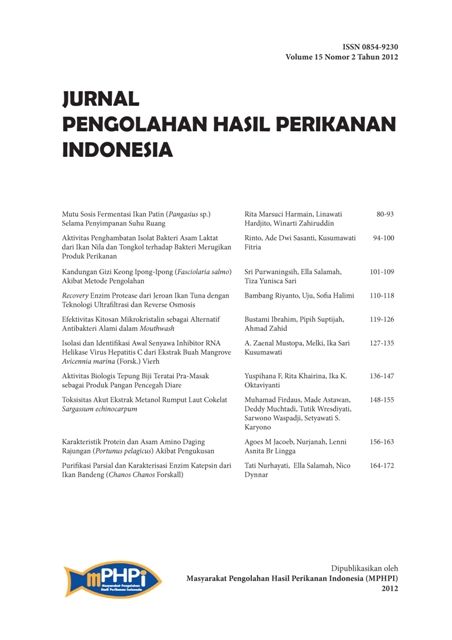RECOVERY ENZIM PROTEASE DARI JEROAN IKAN TUNA DENGAN TEKNOLOGI ULTRAFILTRASI DAN REVERSE OSMOSIS
Abstract
Tuna viscera is highly potential as a source of protease enzyme. A wide enzyme applications requires an economical and efficient enzyme purification techniques and therefore can be applied in a large scale. The ultrafiltration (UF) process is one of the potential technology but has disadvantage due to fouling and concentration polarization. The studies on the operating trans-membrane pressure (TMP), the operating temperature, materials of the membrane and the molecular weight cut off (MWCO) of the membrane to reduce fouling and concentration polarization should be carried out. Reverse osmosis (RO) process at the next step was used to increase the concentration of the protease enzyme. This study was divided into several stages of preparation of protease enzyme, crude extract, pre-filtration, UF process, RO process and SDS-PAGE analysis. The tests included measurements of protein levels and activity of the protease enzyme. Optimum conditions for the purification of the UF polyacrylonitrile with MWCO 100 kDa was obtain on TMP 55 kPa and a temperature of 40 °C. Flux in both membrane was influenced by the TMP, temperature, the membrane material and MWCO. Rejection of protein and enzyme activity in both membrane is more influenced by the membrane material and MWCO of the membrane. Estimation of protein molecular weight after the RO from UF polyacrylonitrile with MWCO 100 kDa were 37.53; 27.77; 22.72 and 19.88 kDa while the specific activity of the protease was 1.38 unit/ mg.
Keywords: protease, tuna viscera, ultrafiltration, reverse osmosis.
Authors
Authors who publish with this journal agree to the following terms:
- Authors retain copyright and grant the journal right of first publication with the work simultaneously licensed under a Creative Commons Attribution License that allows others to share the work with an acknowledgement of the work's authorship and initial publication in this journal.
- Authors are able to enter into separate, additional contractual arrangements for the non-exclusive distribution of the journal's published version of the work (e.g., post it to an institutional repository or publish it in a book), with an acknowledgement of its initial publication in this journal.





